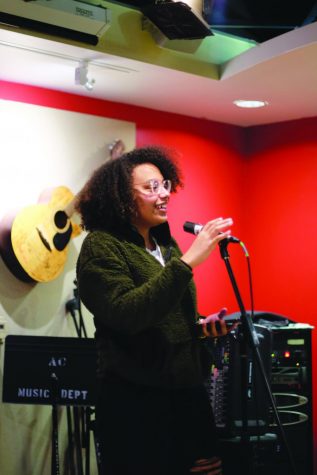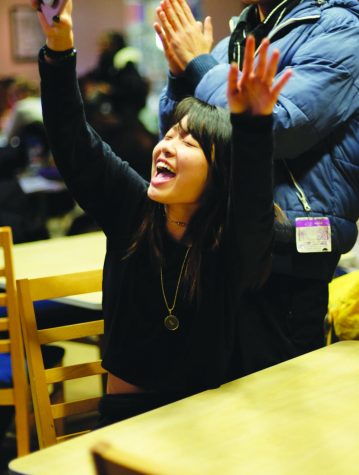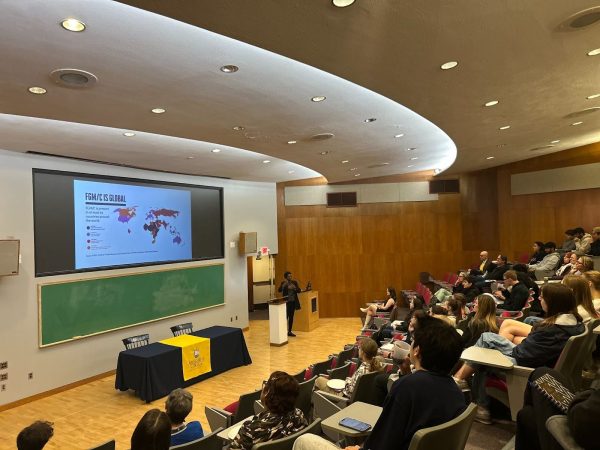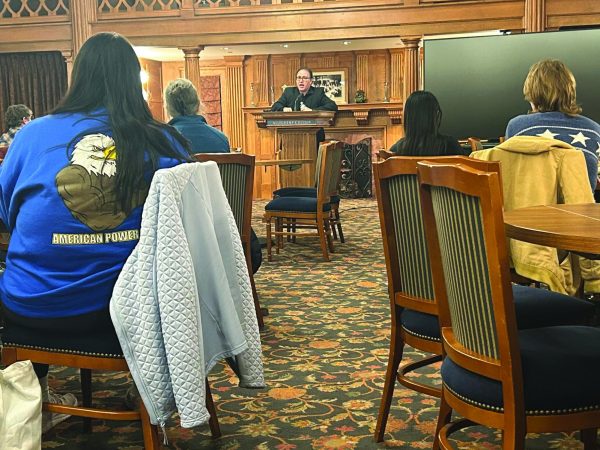50 years of excellence
ABC, student diversity organizations celebrate anniversary of Black History Month
February marks a handful of recognizable dates: Groundhog’s Day on the 2nd, Valentine’s Day on the 14th and this year, Leap Day on the 29th. One celebration — the celebration of Black excellence — spans for the full month, both nationally and at Allegheny College.
“During the month, I see it as a time to truly look at our history and where we’ve come from,” said Manuel Soares, ’22, Black History Month chair for the Association for the Advancement of Black Culture (ABC). “You don’t know where you’re going unless you know where you’ve come from.”

Kamryn Randall, ‘20, smiles while reading her piece at the Black History Month Open Mic Night in Grounds for Change on Tuesday, February 11.
To help the campus community reflect on that history, ABC works with other student-led diversity groups. Groups like the Men of Color Advancement Association (MOCAA), the African Student Association (ASA), the Association for Caribbean Students (ACS), Black Girl Magic (BGM), Union Latinx and Latinas on the Rise contribute by hosting or helping to organize different events that make up the month-long programming.
These events have included movie nights, open mic nights and speakers in past years. Such events vary from year to year, according to Kamryn Randall, ’20, ABC president. Two other events — the Soul Food Dinner and the Ebony Ball — occur annually.
ABC hosted this year’s Soul Food Dinner on Sunday, Feb. 9, in Schultz Banquet Hall, inviting the community to partake in a student-made meal. While Randall said much of the food was traditional Black/Soul foods, Soares noted that any contributions to the “feast” are welcome.
The other annual event, the Ebony Ball, doubles as ABC’s formal, Randall said. Soares said the event’s placement at the end of February is deliberate.
“That’s during Black History Month to end the whole month on a good, high note,” Soares said. “Everyone comes out fully dressed and has a good time. The theme this year is black gods and deities.”
This year, the Ebony Ball is also acting as the afterparty to the month’s main event, according to Soares.
“This year is the 50th anniversary of ABC being on campus, so it was kind of everything times 10,” Soares said. “That’s when I came up with the idea for the ABC awards, which is an awards show that’s going to bring back past alumni that were involved. We’re going to be awarding some faculty and some students as well to have a really big event on the 28th of February.”
Randall said the awards will honor on-campus contributions to black life and contributions made by alumni in their lives since leaving Allegheny, noting such inspirations to the club like the first and second presidents of ABC, who she met over the summer.
“We want to show (that) we were somewhere 50 years ago, and now we’re here, and be able to thank them,” Randall said. “We wouldn’t be here if it wasn’t for the people who were here 50 years ago. I think that’s our biggest thing this month.”
On a national level, the origins of Black History Month extend still further into the past. The roots of the month-long reflection on history are largely credited to American historian Carter G. Woodson, according to a Feb. 1, 2019, article published by CNN. Seeing a failure to represent Black history in textbooks, Woodson established the Association for the Study of Negro Life and History. He proposed Negro History Week, to be observed in the second week of February, in 1926. Fifty years later, Negro History Week became Black History Month.
At Allegheny, spaces like the ones carved out by Black History Month are still essential, according to Randall and Soares. Randall said that she came to Allegheny eager to become involved in organizations committed to celebrating diversity.
“When I first got here, I was really excited to be involved in, it sounds weird, but all the Black stuff,” Randall said. “I’m coming to a predominantly white school. I do not want to get lost. I was like OK, I’m going to try to find people who think like me, and who are experiencing the same types of things that I’m experiencing, so ABC.”
She and Soares both said that the school still has room to improve in its support of the diversity groups and programming, including Black History Month.
“I think it’s really important that Allegheny work with all the diversity organizations to try to highlight the sheer amount of diversity, to make everybody feel like no one is forgotten,” Randall said, noting that she did not expect Allegheny to take over all of the programming because the campus community “is bigger than any one type of person.”
Soares also said that he would like to see much more campus involvement in Black History Month and other attempts to celebrate diversity.
“Specific offices have been very supportive, but I do think that other offices could be much more willing to work with us and also just coming to support,” Soares said, noting that many people and staff provide “behind the scenes” support and resources but that he would appreciate seeing more “open support.”
He noted that misconceptions of Black History Month might keep students from being involved.

Alexis Pham, ‘22, enjoys the performances at Open Mic Night on Tuesday, February 11.
“Some people see (Black History Month) as a safe space for students of color,” Soares said. “And it is a safe space, but that doesn’t mean that you’re not allowed to come and enjoy that space with us. I think that’s something that could be worked on, is everyone recognizing that no matter who you are and how you identify, you’re all welcome in this space to come and appreciate black culture with us, especially during Black History Month.”
Randall says those safe spaces have changed her time at Allegheny for the better.
“It’s just so important to make people feel like they belong in a place that is so; I wouldn’t say small, but we’re an intimate community,” Randall said. “At the end of the day, we know that there are people that we can come to to talk or have a meal and just hang out.”
Soares said that the efforts of such groups should be celebrated — and of the broader Black community — for the entire year, not just during the month of February. During that celebration, though, Soares said he thinks the campus has an excellent opportunity to reflect on their history and origins.
“You don’t know where you’re going unless you know where you’ve come from,” Soares said. “Not everything’s perfect. We still have our own things to get through, but I think that Black History Month is a perfect time for us to come together and appreciate each other and work together to address the problems that we have today.”
Olivia Blakeslee is a senior majoring in English with a minor in journalism in the public interest. This is her fourth year on staff, and she is serving...







